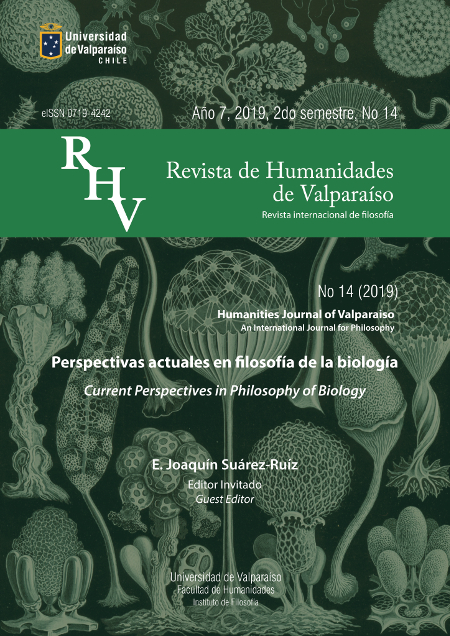Completud débil y Post completud en la escuela de Hilbert
DOI:
https://doi.org/10.22370/rhv2019iss14pp449-466Palabras clave:
historia de la lógica, lógica clásica, formas normales, corrección, BernaysResumen
El objetivo de este artículo es aclarar por qué la lógica proposicional es Post completa y su completud débil pasó casi desapercibida para Hilbert y Bernays, mientras que la lógica de primer orden es Post incompleta y su completud débil fue vista como un problema a resolver por Hilbert y Ackermann. Así, compararé la lógica proposicional y de primer orden en los Prinzipien der Mathematik, la segunda Habilitationsschrift de Bernays y los Grundzüge der Theoretischen Logik. La así llamada “interpretación aritmética”, las formas normales conjuntiva y disyuntiva y la corrección de las reglas proposicionales de inferencia merecen especial énfasis.
Descargas
Referencias
Hilbert, D. (2013), David Hilbert’s Lectures on the Foundations of Arithmetic and Logic 1917–1933, W. Ewald y W. Sieg (eds.), pp. 231-269. Berlin: Springer.
Dreben, B., van Heijenoort, J. (1986). Introductory note to 1929, 1930 and 1930a. En Gödel, K. (1986), Collected Works, vol. 1. S. Feferman et al. (eds.), pp. 44-59. Oxford: Oxford University Press.
Gödel, K. (1929). On the completeness of the calculus of logic. En Gödel, K. (1986), Collected Works, vol. 1. S. Feferman et al. (eds.), pp. 61-101. Oxford: Oxford University Press.
Gödel, K. (1930). The completeness of the axioms of the functional calculus of logic. En Gödel, K. (1986), Collected Works, vol. 1. S. Feferman et al. (eds.), pp. 103-123. Oxford: Oxford University Press.
Gödel, K. (1986). Collected Works, vol. 1, S. Feferman et al. (eds.). Oxford: Oxford University Press.
Hilbert, D. (1904). On the foundations of logic and arithmetic. En van Heijenoort, J. (ed.) (1967), From Frege to Gödel. A Source Book in Mathematical Logic 1879-1931, pp. 129-138. Harvard: Harvard University Press.
Hilbert, D. (1917-18). Prinzipien der Mathematik. En Hilbert, D. (2013). David Hilbert’s Lectures on the Foundations of Arithmetic and Logic 1917–1933, W. Ewald y W. Sieg (eds.), pp. 59-219. Berlin: Springer.
Hilbert, D. (2013). David Hilbert’s Lectures on the Foundations of Arithmetic and Logic 1917–1933. W. Ewald y W. Sieg (eds.). Berlin: Springer.
Hilbert, D., Ackermann, W (1928). Grundzüge der theoretischen Logik. En Hilbert, D., (2013). David Hilbert’s Lectures on the Foundations of Arithmetic and Logic 1917–1933,
W. Ewald y W. Sieg (eds.), pp. 809-916. Berlin: Springer.
Lewis, C. I. (1918). A Survey of Symbolic Logic. Berkeley y Los Angeles: University of California Press.
Löwenheim, L. (1915). On possibilities in the calculus of relatives. En En van Heijenoort, J. (ed.) (1967), From Frege to Gödel. A Source Book in Mathematical Logic 1879-1931, pp. 228-251. Harvard: Harvard University Press.
Mancosu, P. (2010). The Adventure of Reason. Interplay between Philosophy of Mathematics and Mathematical Logic, 1900-1940. Oxford: Oxford University Press.
Manzano, M., Alonso, E. (2014). Completeness: from Gödel to Henkin. History and Philosophy of Logic, 35(1): 1-26. https://doi.org/10.1080/01445340.2013.816555
Monk, R. (1994). Ludwig Wittgenstein. Barcelona: Editorial Anagrama.
Post, E. (1921). Introduction to a general theory of elementary propositions. En van Heijenoort, J. (ed.) (1967), From Frege to Gödel. A Source Book in Mathematical Logic 1879-1931, pp. 264-283. Harvard: Harvard University Press.
van Heijenoort, J. (ed.) (1967). From Frege to Gödel. A Source Book in Mathematical Logic 1879-1931. Harvard: Harvard University Press.
Wittgenstein, L. (1922). Tractatus logico-philosophicus. Londres: Kegan Paul.
Zach, R. (1999). Completeness before Post: Bernays, Hilbert and the development of propositional logic. Bulletin of Symbolic Logic, 5(3): 331-366.
Descargas
Publicado
Número
Sección
Licencia
Aquellos autores/as que tengan publicaciones con esta revista, aceptan los términos siguientes:
- Los autores/as conservarán sus derechos de autor y garantizarán a la revista el derecho de primera publicación de su obra, el cual estará simultáneamente sujeto a la Licencia de reconocimiento de Creative Commons (CC BY-NC-ND 4.0 International) que permite a terceros compartir la obra siempre que se indique su autor y su primera publicación esta revista.
- Los autores/as podrán adoptar otros acuerdos de licencia no exclusiva de distribución de la versión de la obra publicada (p. ej.: depositarla en un archivo telemático institucional o publicarla en un volumen monográfico) siempre que se indique la publicación inicial en esta revista.
- Se permite y recomienda a los autores/as difundir su obra a través de Internet (p. ej.: en archivos telemáticos institucionales o en su página web) antes y durante el proceso de envío, lo cual puede producir intercambios interesantes y aumentar las citas de la obra publicada. (Véase El efecto del acceso abierto).






